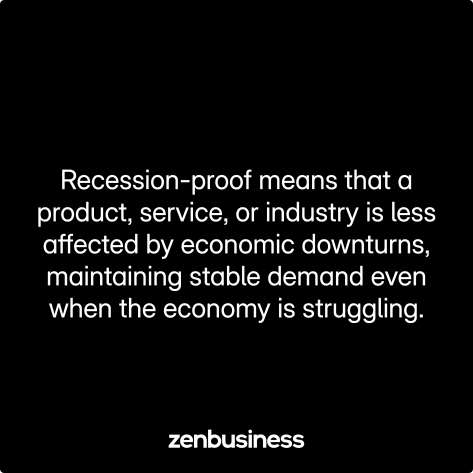Recession-proof means that a product, service, or industry is less affected by economic downturns, maintaining stable demand even when the economy is struggling.

Starts at $0 + state fees and only takes 5-10 minutes
Last Updated: January 10, 2026
No one likes to talk about recessions, but they happen. Some business owners strive to start businesses that are more recession-proof to help their entity survive during an economic downturn.
But what, exactly, does recession-proof mean? What qualities make a business recession-proof? This guide will answer these questions and more.

A business can meet the recession-proof definition when it utilizes sustainable practices to generate a profit, regardless of an economic downturn. Forbes defines a recession as an extended period of negative gross domestic product (GDP), high unemployment, fewer retail sales, and decreased income and manufacturing. The recession-proof business owner understands that an economic recession is a normal and unavoidable stage of economic growth. Making a business recession-proof means being flexible and leveraging company resources to help ensure that a business survives a recession.
In 2025, economists are closely watching the effects of new U.S. tariffs on imported goods from China and the European Union, which have increased prices on key materials and disrupted global supply chains. These trade policies, alongside lingering inflation and higher interest rates, have led some experts to raise their forecasts for a potential recession. Businesses that are prepared to adapt quickly — such as those with diverse revenue streams or essential services — are more likely to weather these economic headwinds.
During a recession, smart investors realize the advantages of having recession-proof stocks (also called “defensive stocks,”) like healthcare or utilities, to sustain their portfolio. The same is true for a business hoping to sustain its operations and capital. Choosing strong suppliers can help business owners bolster their inventory and continue operating regardless of high prices and low employment. Including recession-proof inputs into a business plan can improve an entrepreneur’s chances of securing new capital investments.
Recession-proof businesses also tend to maintain customer loyalty because they offer essential goods or services. Think grocery stores, healthcare providers, and repair services — these businesses meet ongoing consumer needs, even during financial uncertainty.
A small business owner can plan for and expect the effects of an oncoming recession. However, one of the disadvantages of being recession-proof is that putting the business plan into practice can be stressful. An entrepreneur might find themselves trying to manufacture a product or deliver a service with limited inputs. At the same time, as they’re trying to find new revenues, other businesses fail all around them. The entrepreneur will need to work harder, find new revenue streams, and reinvest in themselves. Furthermore, a recession means fewer competitors, so forward-thinking business owners will prepare for when the economy starts to turn around, and others enter the market.
It’s also important to monitor changes in economic policy, such as tariffs, interest rate adjustments, or tax shifts, as they can have ripple effects throughout different industries. Staying informed and agile is part of being truly recession-proof.
The recession-proof business definition can best be explained with a few examples:
A successful small business is naturally recession-proof, meaning its owners must always respond quickly and be flexible. Small businesses often have to adapt to economic challenges, whether a recession or other event.
The recession-proof definition includes a business, market, or asset that can maintain its value during an economic downturn. Planning and adapting quickly are essential to make a business recession-proof. With growing economic uncertainty throughout 2025 — from inflation to interest rates to trade disruptions — staying resilient and ready to pivot has never been more important.
Staying recession-proof isn’t easy to do alone. ZenBusiness’s business experts can help entrepreneurs every step of the way, through thick and thin. Their business formation services make it hassle-free (and affordable) to open a new LLC or corporation. Then, their Worry-Free Compliance Service makes it easy to stay organized and compliant with state deadlines. When times are tough, dealing with paperwork and red tape is even more challenging, so let ZenBusiness handle that task.
Recommended Articles
Disclaimer: The content on this page is for information purposes only and does not constitute legal, tax, or accounting advice. For specific questions about any of these topics, seek the counsel of a licensed professional.
Ready to Start Your Business?
